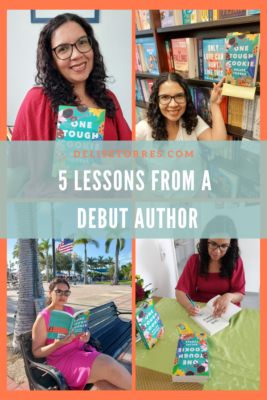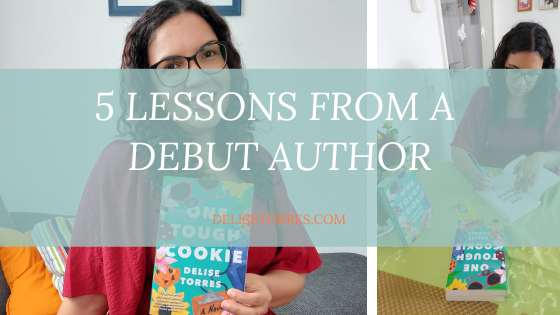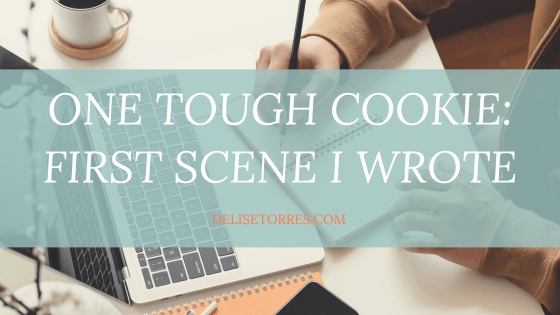On July 18, 2023, I finally became a debut author with the publication of my novel, One Tough Cookie. As we near the one-year anniversary of that day, I want take stock of everything I’ve learned during this journey. Here are 5 lessons from a debut author. Note that my experience stems from traditional publishing with a small, independent press.
1. Make a marketing plan and take charge
Once I got a book deal, I immediately started researching marketing strategies. Since my publisher is small, I knew they wouldn’t be able to offer a lot of marketing and publicity support. I would have to do a lot on my own. Resources like Mixtus Media and Author Marketing Experts helped me narrow my focus to the most important tasks. Since I live in Germany and my readers are in the United States, I decided to focus on online marketing efforts, including social media, content marketing, and my newsletter.
In terms of content marketing, I wrote guest posts for Women Writers, Women’s Books related to themes from my book. On my website and social media, I shared my character aestethics, my book playlist, and my experiences writing and publishing One Tough Cookie. I also wrote posts about Puerto Rico since most of my characters are of Puerto Rican descent (as am I).
To increase my newsletter subscribers, I joined a BookSweeps giveaway, which got me an extra 300 subscribers. I pitched myself for podcasts and blog interviews as well.
I created a marketing plan and communicated it to my publisher, so that we could work together to make it happen. Here’s where most of my money went:
- Canva Pro – I love that I have a bigger selection of images to choose from and the ability to resize graphics.
- Elementor Pro – This is a website builder, also availabe with a free version. The pro gives me more power to modify my website however I want without any programming experience.
- Goodreads Giveaways – I did two Goodreads giveways (one for Advance Reader Copies or ARCs and one for finished copies). These help readers learn that your book exists and when they enter the giveaway, they automatically add your book to their shelves.
- The Storygraph Giveway – I also paid for the beta giveaway on The Storygraph for digital copies. I got impressions, but the site doesn’t offer any author analytics yet so it was hard to know how successful it was in maintaining readers’ attention.
- IG Book Tours – I did two of these, one with Kate Rock Book Tours and one with Hear Our Voices Tours. The first one specializes in women’s fiction/romance and the second one in marginalized groups, in my case Latinx readers. Both helped me expand my reach, and I definitely recommend either one of these services.
- Book Trailer – I commissioned a book trailer from fellow author Kate Dylan, and it turned out so well! I love that she offers it in different sizes so that I can share it not only on my website but on social media. She really captured the essence of my book. Check it out!
- Bookmarks & Bookplates – An author friend designed them for me, and I loved how they turned out. I used it as a preorder incentive, sent them as thank you gifts, and also took the bookmarks to bookstores. Definitely worth the investment since you can keep using them as long as you don’t date them.
- Art Commission – I commissioned an animated depiction of a scene from my book from illustrator Jacqueline Li. I turned it into cards to send as thank you gifts.
- Sponsored Ads on Women Writers, Women’s Books – This website targets women writers by offering writing tips, reviews, and publishing advice. They offer ad placement of books on their website, which I did for two months. The owner of the site also shared my cover and Amazon link on social media. It’s hard to measure how this translated to sales but I think it increases visibility in this crowded marketplace, which is so hard to get.
My publisher and I worked as a team. I didn’t wait for them to do anything for me, only told them what I wanted to do and asked for support when I needed it. For example, I paid for the giveaways but they sent out the books to the winners. They provided the books for the book tours too, and I was able to negotiate the amount of books I needed. So my best advice is to take charge and be your own advocate. Don’t be afraid to ask questions. Ask how you can support marketing and publicity. Ask what they will do for you and what they won’t. No one can advocate for your career and your book better than you can.
2. Join a debut group
Traditionally published authors organize debut groups for each year. Joining the 2023 debut group offered me great support. I learned so much from them! We boosted each other’s social media posts, shared tips and tricks, and supported each other through the ups and downs of the publication journey.
3. Manage expectations and practice gratitude
We all want our books to become a New York Times Bestseller or a Reese’s Book Club pick but only a few can manage it. What if your book is not one of them? That was my case. It was hard seeing other debut books getting on best-of lists, having blurbs from famous authors, or a starred review from a trade reviewer, but not my book.
I tried to focus on my own achievements and celebrate each milestone: the cover reveal, blurbs, seeing my book on Goodreads. My book got featured on some lists and was chosen for a book box. These were small in comparison, but they were something. I got messages from readers that they were enjoying my book. I got to do interviews to talk about my journey. This was what I’d always envisioned, what I’d wanted. I learned to be grateful for each little win, no matter how small, and documented every one on a journal I prepared for this purpose.
So try not to play the comparison game. I had to take breaks from social media or mute some people I followed because, though I was happy for them, it was hard for me to see them celebrate something I would’ve liked but wasn’t getting. This helped me to not get discouraged and keep going. I started working on my next book.
4. Learn how to interpret your royalty statement
For those not familiar with how traditional publishing works, authors get an advance payment when they sign a book deal. Once this advance is paid back to the publisher through royalties (the percentage authors get from each individual sale), they “earn out” and can start getting additional payments from those royalties.
When I got the first sales numbers from my publisher, I was ecstatic. In a month, I had sold over 1K paperback copies! I used this calculator to see when I would earn out, and it seemed as if just those sales were enough. Had I earned out so fast with a book that had little to no buzz?
Well, not really. When I got my first royalty statement, covering the period from March to August 2023, I noticed an amount of money that was not counted toward my advance called “reserves against returns.” You see, publishers sell books to bookstores, and if the bookstores haven’t sold those books by a certain date, they can return them and get their money back. So in my statement, there were reserves of about $300 dollars. And though the publisher counted over 1K sales, approx. 600 paperback books could still be returned.
When I got my second royalty statement, approximately 400 books had been returned. And since it had been over six months since my publication date, demand wasn’t as high, so my publisher had only sold an additional 80 books in the span of September to February. This doesn’t mean I only sold 80 copies of my book during this period. It means that those were the only orders my publisher got for my book. There are books still in bookstores. Unless those sell and the bookstore wants to order more, I won’t get any more royalties. And so, it will be some time until I actually earn out (unless I sell a bunch of ebooks).
My advice: be clear about how your royalties are calculated. In my case, my royalties are calculated from the net price, so the price at which the publisher sells to the booksellers, which is lower than the retail price.
Also, verify your Bookscan numbers with your publisher. Bookscan records Point of Sales, meaning actual sales from booksellers to consumers. But the report can be incomplete. I realized that Bookscan was only reporting 43% of my sales. And though, every week I have Bookscan sales, that doesn’t mean I’ll get royalties on those, since those books have already been accounted for by my publisher.
5. Do as much as you can but don’t burn yourself out
I started writing One Tough Cookie in 2018. During those four years before I got my book deal, I kept picturing everything I would share about it. “Oh, this would be a cool quote or anecdote,” I thought. When it was finally official, I started sharing everything I’d been dying to talk about: character aesthetics, the playlist, deleted scenes, my writing journey, my inspiration, everything . But then came June, one month before pub day, and I was burned out. I didn’t want to share any more.
For my next book, I will wait until three months out to really make the promotion push. It’s been almost a year since my book came out and I’m still burned out from social media. Since I don’t have another book to promote yet, I don’t really know what else to share. I’ve shared it all.
I’m trying to fill my creative well by focusing on my next book, and the next, and not focusing so much on promotion and social media. I’ve started playing with Amazon Ads. It’s costly but it takes less time to set up and maintain than social media. I decided to send my newsletter quarterly instead of monthly. Anything to save up energy until I have to do it again.
If you’re a published author, what was your biggest takeaway from your debut year? If you have yet to publish your first book or are about to debut, what was your biggest takeaway from this post? What do you feel most anxious about? Share in the comments below.






